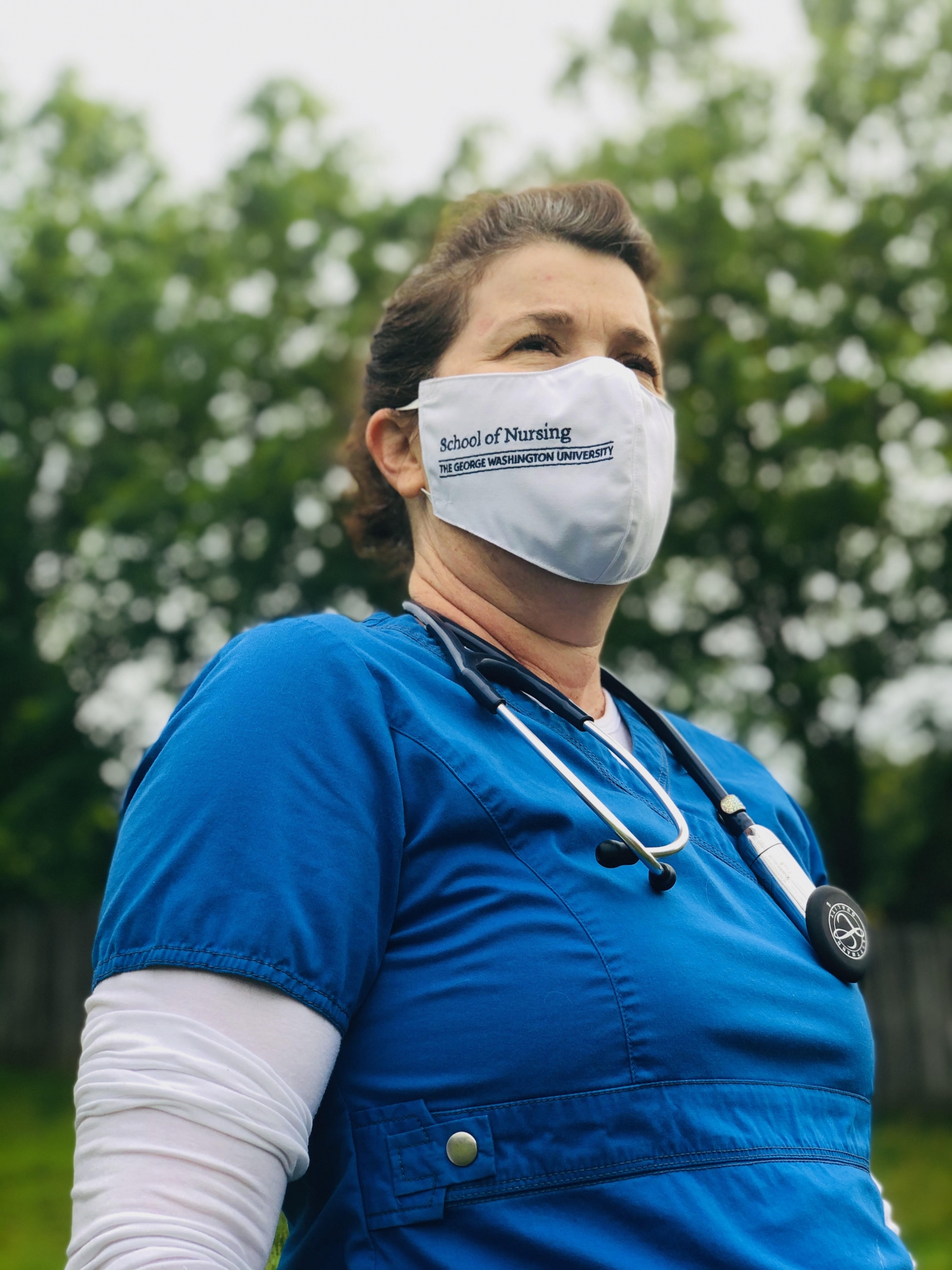For Elizabeth Bailey, caring for COVID-19 patients this spring revealed a truth about health care. “The news about COVID-19 changes every day, but that on some level is true about every illness; there is always going to be a new best practice and new guidelines,” said Ms. Bailey, M.S.N.’20, RN.
Prior to the pandemic, she worked on an observation unit at Anne Arundel Medical Center, essentially serving as charge nurse. As the pandemic swept through the Washington, D.C. metro region, her hospital created a COVID-19 unit.
As clinical supervisor of that unit, the former Naval officer understood her mission. “My job was to keep staff informed, deal with fears, deal with the multitude of issues that crop up during any crisis, including new symptoms in a patient and lack of supplies,” Ms. Bailey said.
During a crisis, flexibility is key, she said. As has been well-publicized, availability of personal protective equipment presented a huge problem to health care providers, particularly at the start of the COVID-19 pandemic. At her hospital, they started considering how providers could stay safe but also avoid unnecessary waste: gowns that could be laundered presented one solution. They also considered different ways of using equipment, and ensuring people had the right equipment for tasks they performed.
Wearing visors over faces presented the problem of the visors fogging up, and they got creative in how they addressed that problem. Applying shaving cream and wiping it off does work, Ms. Bailey said.
Staff who weren’t used to staying in N-95 masks all day weren’t drinking as often and became dehydrated; they had to be educated in how to stay well themselves, she said.
“Say I have the best N-95 and best gown and look like going to do a moonwalk. That does no good if I’m rubbing my face because my glasses fogged up or passing out,” Ms. Bailey said. “You find problems you didn’t know existed until this happens. The big thing about getting through a crisis is flexibility and thinking outside the box, and not just doing something like using a disposable gown and just throwing it away,” she said.
As she faced a pandemic at work, Ms. Bailey was also completing coursework for the Master of Science in Nursing (M.S.N.) in adult gerontology acute care. She graduated in May, and received GW Nursing’s Clinical Excellence for Adult-Gerontology Acute Care Nurse Practitioner Award.
Though an award-winning acute care student, that had not been her original M.S.N. concentration. She had initially enrolled in the school’s Nurse Leadership and Management (NLM) M.S.N. concentration. Two semesters in, she realized that she had a different calling.
“I didn’t want to leave the bedside,” she said. “I imagined myself on the NLM trajectory. Me in a budget meeting? I couldn’t imagine that.”
She emailed her GW Nursing advisor on a Thursday, who got her in touch with Dr. Linda Briggs, the AGACNP program director. After a lengthy call with Dr. Briggs in which they discussed Ms. Bailey’s career goals and interests, and a transcript review, Ms. Bailey on the following Monday transferred into the AGACNP pathway. “Nowhere else have people been that responsive to my requests at any hour,” she said.
Having already switched majors in her undergraduate coursework at the Naval Academy, and shifted careers from U.S. Naval pilot to nurse, Ms. Bailey is unafraid to shift course.
“Aim in a direction that speaks to your heart. If it doesn’t work for you, you can change it up,” she said.
Now with an advanced degree, she’s considering future options. First, she takes her nurse practitioner boards. Then she’s planning to look for an intensive care unit (ICU) position. Eventually, she sees herself working in palliative care but first wants to spend as much time as she can learning at the bedside.
Palliative care speaks to her internal drive. “No one wants to have the difficult discussions or answer the difficult questions. I am comfortable with that,” she said.
Amid the COVID-19 pandemic, she really enjoyed going to work. “As crazy as it sounds, it was getting back to the core of what nursing is about; helping get everybody, staff and patients through a crisis,” she said.
Please consider honoring the work that nurses do each day by making a gift to support GW Nursing scholarships. Your gift today will support a student entering our accelerated B.S.N. program this fall.


